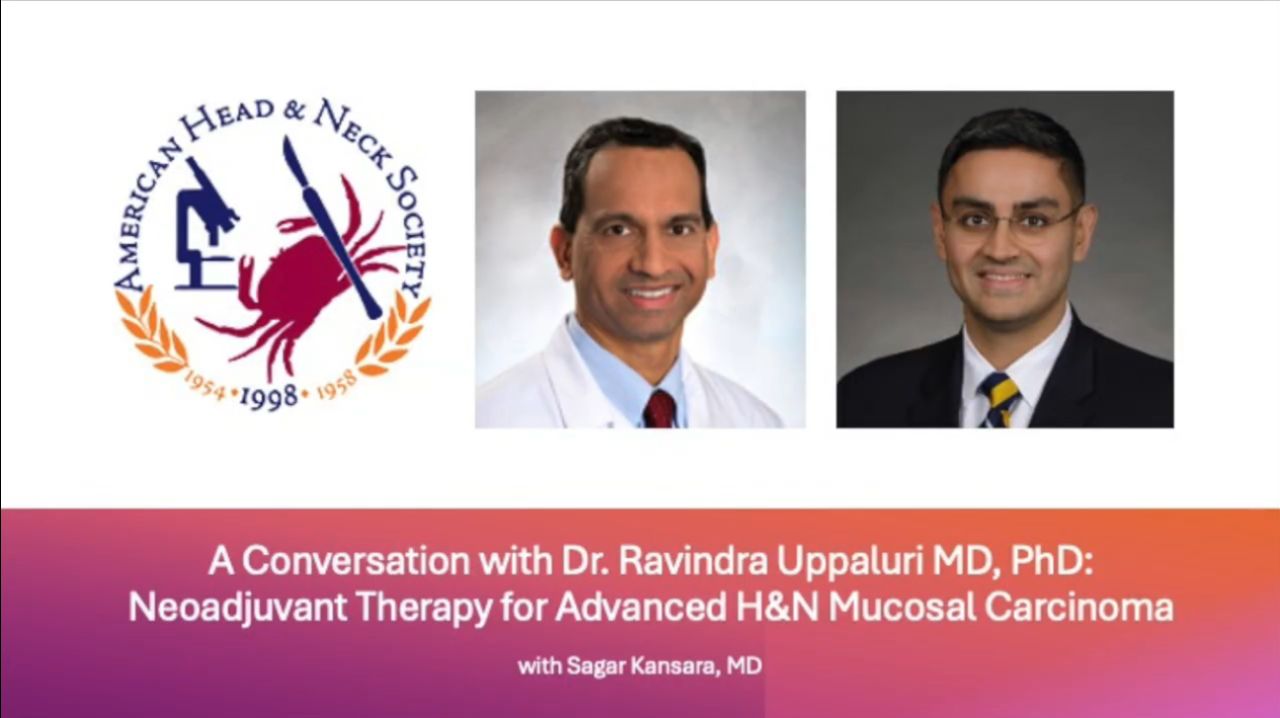A Conversation with Ravindra Uppaluri, MD, PhD:
Neoadjuvant Therapy for Advanced H&N Mucosal Carcinoma
with Sagar Kansara, MD
Presented by the AHNS Population & Health Clinical Research Service
Dr. Ravindra Uppaluri and his collaborators have laid the groundwork of correlative science for an exciting new treatment paradigm in the management of traditional head and neck cancer. Now, his own clinical trial research on neoadjuvant therapy is changing the way that surgeons think about multimodal cancer treatment.
In an AHNS-facilitated conversation with LSUHSC Department of Otolaryngology’s Dr. Sagar Kansara, Dr. Uppaluri discussed the latest findings of his Merck-sponsored study, entitled KEYNOTE-689: neoadjuvant immunotherapy for advanced mucosal head and neck cancer.
Understanding Neoadjuvant Therapy
Neoadjuvant therapy involves treatments like immunotherapy given as a first step to "prime" the immune system with a clonal population of tumor specific T lymphocytes, which results in enhanced anti-tumor immunity. This is thought to decrease the rate of distant metastasis, which accounts for a large majority of the morbidity and mortality associated with this deadly disease. “As surgeons, we’re trained to think about getting the patient to the OR relatively quickly,” Dr. Uppaluri says, describing the typical surgery-first approach to advanced head and neck cancer treatment. But providing neoadjuvant immunotherapies before surgery may be beneficial, indicated by the preliminary findings of KEYNOTE-689. “What people used to call a delay in surgery is actually not a delay in surgery,” says Dr. Uppaluri. “You’re actually starting therapy.”
Multidisciplinary Approach
When head and neck cancer patients are treated with multimodal approach of surgery followed by adjuvant therapy, they still have a high rate of local regional recurrences and distant disease, Dr. Uppaluri says. Adding neoadjuvant therapy before surgery—in addition to after surgical intervention and traditional adjuvant radiation—could improve those outcomes.
KEYNOTE-689 investigates the effects of adding neoadjuvant and adjuvant immunotherapy Pembrolizumab to standard care for patients with resectable, locally advanced head and neck cancer.
“The results were exciting for the field,” says Dr. Uppaluri, describing the first interim analysis of the trial, which indicated a statistically significant and clinically meaningful event-free survival rate in patients who received neoadjuvant and adjuvant Pembrolizumab.
Moreover, the addition of neoadjuvant therapy didn’t increase surgical complications, according to the study. Dr. Uppaluri hopes that these findings will lead to a new standard of care for locally advanced resectable head and neck cancer patients.
Future Directions
The conversation addressed potential challenges for implementing neoadjuvant therapy into standard head and neck cancer treatment, from patients who didn’t respond to immunotherapy during the trial to changing the standard care practices and perception in the surgical community.
Overall, these challenges present opportunities for further investigation, and Dr. Uppaluri expressed optimism about ongoing research and future advancements in cancer treatment. He also emphasized the importance of multidisciplinary approaches. None of this would’ve been possible, he says, without the collaboration of his medical oncology, radiation oncology, and surgical colleagues. When it comes to cancer treatment, “It’s a true multidisciplinary effort.”
Additional information can be found in this exciting new work by Dr. Uppaluri, Dr. Kansara, and the American Head and Neck Society Population Health and Clinical Research Service Committee, published in JAMA Otolaryngology – Head & Neck Surgery in April 2025 (PMID: 40272829).
By Dylan Hawkins, May 13, 2025

